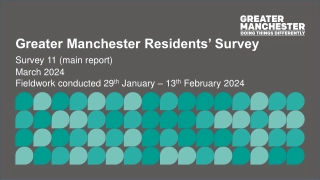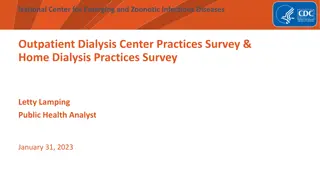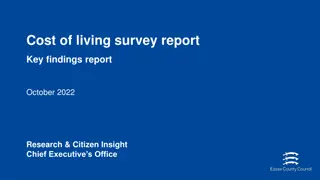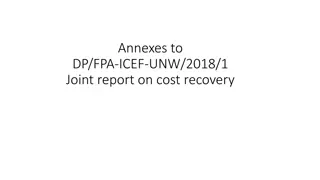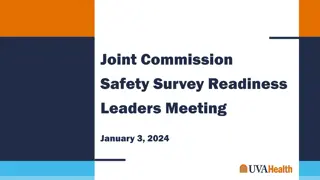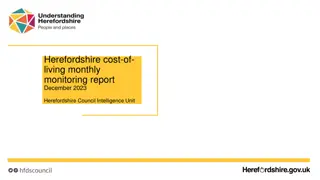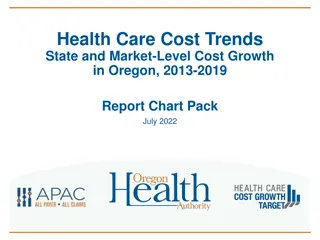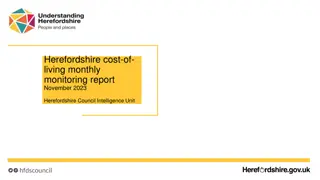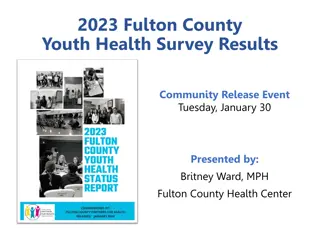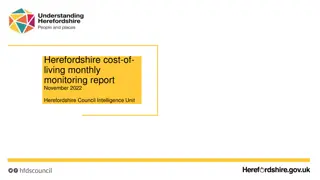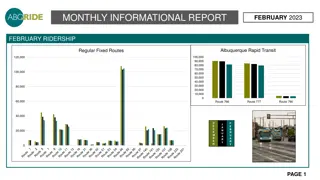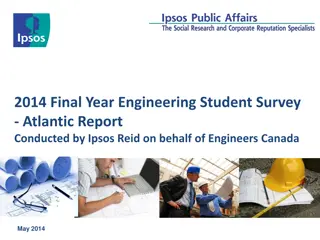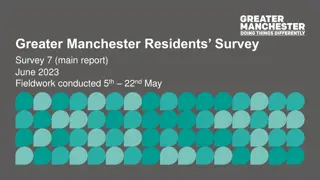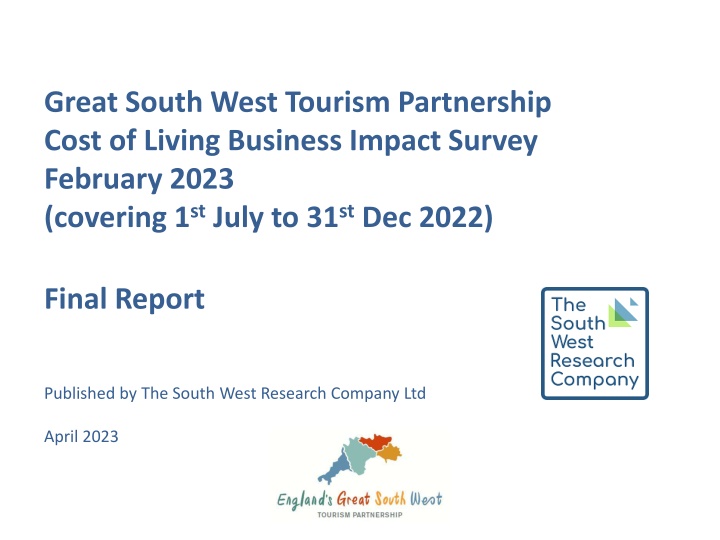
South West Tourism Business Impact Survey 2023 Report
"Discover key findings from the Great South West Tourism Partnership Cost of Living Business Impact Survey conducted by The South West Research Company Ltd. Learn about the economic impact, operational performance, inflationary pressures, and business strategies in response to rising costs."
Download Presentation

Please find below an Image/Link to download the presentation.
The content on the website is provided AS IS for your information and personal use only. It may not be sold, licensed, or shared on other websites without obtaining consent from the author. If you encounter any issues during the download, it is possible that the publisher has removed the file from their server.
You are allowed to download the files provided on this website for personal or commercial use, subject to the condition that they are used lawfully. All files are the property of their respective owners.
The content on the website is provided AS IS for your information and personal use only. It may not be sold, licensed, or shared on other websites without obtaining consent from the author.
E N D
Presentation Transcript
Great South West Tourism Partnership Cost of Living Business Impact Survey February 2023 (covering 1st July to 31st Dec 2022) Final Report Published by The South West Research Company Ltd April 2023
Headlines This report contains a summary of the findings from the Great South West Tourism Partnership Cost of Living Business Impact Survey undertaken by The South West Research Company Ltd during February 2023 covering business performance between the 1st July to the 31st December 2022. Key headline findings: Operations July to December 2022 - 75% of businesses had been operating at 76% capacity or more during the July to December 2022 period. 25% of businesses had been operating at 75% capacity or less including. 2% (8 businesses) had remained closed during this period. Economic Impact - 41% of businesses reported a decrease in their business turnover for the period July to December 2022 compared with the same period in 2019. Economic Impact - Overall businesses reported that turnover between July to December 2022 was 6% lower than the same period in 2019 (approximate value 227m). Operations January to March 2023 - 56% of businesses anticipated they would be operating at 76% capacity or more during the January to March 2023 period. 36% of businesses anticipated they would be operating at 75% capacity or less . 8% of businesses anticipated they would be closed during this period. Growing costs & cost of living - 96% of businesses said they were very concerned (71%) or somewhat concerned (25%) about growing costs and the impacts of the cost of living crisis on their business. When asked which inflationary items thought were having the most impact on their business by far the largest proportion of businesses (86%) said electric energy costs, followed by building & maintenance costs (57%), gas energy costs (51%), insurance premiums (50%), staff/labour costs (46%) and food supplies (45%). 2
Headlines Inflationary pressures - When asked what they think will be the approximate total change in their businesses' operational costs as a result of these inflationary items, the largest proportion of businesses (37%) said they are likely to increase by more than 20%, 25% by between 16-20% and 20% by between 11-15%. Inflationary pressures- When asked how their business was responding to the rising costs, 81% of all businesses said they had increased their prices including 30% in each case by up to 5% or by more than 5% but less than 10% and 21% by 10% or more. 41% of all businesses said they were delaying refreshment/maintenance of their business premises and 39% were delaying/cancelling investment in new developments. 32% were closing for a period of time. Cash reserves - When asked how many months cash reserves they had, 25% of all businesses said they had more than 2 months but less than 6 months available and a further 23% said they had more than 6 months. 24% of businesses said they only had up to 2 months cash reserves available and 17% said they had none. 9% of businesses didn t know/were unsure how many months cash reserves they had. Survivability - When asked which period they currently anticipate is the furthest that their business will be able to survive until without further support, 41% of all businesses said beyond Summer 2023 (after 31st August 2023). 33% of businesses don t know/were unsure. 12% of businesses felt they could only survive through until the Summer of 2023 (up to 31st August 2023), 6% up until the end of Spring 2023 (up to 1st May 2023) and 7% up until the end of Winter 2023 (up to 31st March 2023). 74% of businesses were confident to some degree in their assessment of how long they could survive. Recruitment 16% of all businesses were currently recruiting. The largest proportion of businesses (who were recruiting) were doing so for part-time temporary/seasonal positions (59%) and full-time permanent positions (54%). 43% of businesses (who were recruiting) were looking for cleaning/housekeeping staff, 35% for front of house/reception positions and 28% for chefs. 3
Headlines Recruitment - In order to try and resolve any shortages in staff/recruitment issues they were experiencing, 67% of those businesses currently recruiting were paying higher wages, 36% were hiring unskilled staff and providing them with training and 33% had reduced their capacity, services or hours of opening. Insurance premiums - 80% of businesses said their insurance premium had increased compared with the previous year including 34% by between 6% and 10%, 12% in each case by up to 5% or by between 11% and 15% and 10% by between 16% and 20%. 3% of businesses said their premium had stayed the same, 1% that it had decreased and 14% didn t know/were unsure. Investment - The proportion of businesses who had spent nothing/made no investment in their business during the winter of 2022/23, at 34%, was almost a threefold increase compared with the proportion of businesses usually not investing anything (12%). 44% of businesses spent 10k or less on investment in their business, a decrease of 6% compared with the usual proportion of businesses spending this amount (50%). 9% spent 11 to 25k, a decrease of 10% compared with the usual proportion of businesses spending this amount (19%) and 6% spent 26 to 50k, a decrease of 4% compared with the usual proportion of businesses spending this amount (10%). Those investing 51k or more within each of the investment bands during the winter of 2022/23 remained broadly similar to usual. Business support - The top 3 priorities to help their business survive and grow over the next 12 months are; 75% would like a review of the level of support offered in the Energy Bills Discount Scheme (ends 31/3/24); 63% would like a lower rate of VAT for tourism and hospitality businesses reintroduced and 19% would like to see UK workers encouraged to enter the industry. In addition, 20% of all businesses mention other priorities including issues relating to the fair regulation of all businesses including Airbnb s, supporting businesses with rising energy costs, raising the VAT threshold and business rates support/reduction. National domestic marketing campaign - 61% of businesses said a national marketing campaign it is very important (35%) or important (26%) to the success of their business. 4
Sample summary Sample profile A total of 519 businesses responded to the survey although actual business representation will be larger due to a number of self-catering agencies responding. National tourism survey data, local areas survey data and Cambridge Model data from 2019 has been used to model the outputs in this report. 68% of businesses responding to the survey were accommodation providers, 14% were food and drink businesses and 5% were a visitor/leisure attraction. 4% were a retail business and 1% in each case were a self catering agency or an event organiser. 5% categorised themselves as on 'other' business type including a beauty salon, taxi firm, tour guide/company, theatre etc. 63% of the accommodation businesses were self catering operators and 32% serviced accommodation providers. 5% were other accommodation types including holiday parks and caravan/camping sites (2% each). 42% of the visitor/leisure attraction businesses were predominantly based outdoors and 31% had a good mix of both indoor and outdoor attractions/ entertainment/activities. 28% were predominantly based indoors. 53% of the businesses responding to the survey had a rateable value band of under 15,000 and 55% were currently not VAT registered. 57% of businesses responding to the survey were based in Devon (including 30% in Torbay), 19% were based in Cornwall & the Isles of Scilly, 15% in Dorset and 5% in Somerset (excluding North Somerset). 4% said they were based elsewhere. Due to the low sample size for Somerset (26 businesses), the results for this county should be interpreted with caution. 5
Sample profile by county Cornwall & IoS GSW Devon Dorset Somerset 519 (100%) 101 (19%) 77 26 (5%) 296 (57%) Total sample size (% of total sample): (15%) Business type: An accommodation establishment A visitor or leisure attraction Sports or activities-based business A food and drinks related business - pub, restaurant, cafe, take-away A retail business (excluding food and drinks) A Tourist Information Centre A Self Catering agency Event organiser International education provider Other type of business Accommodation type: Serviced accommodation Self catering accommodation Other accommodation type (incl. holiday parks, caravan/camping site and other accommodation types) 68% 5% 2% 83% - 3% 66% 4% 2% 56% 13% - 73% 8% 4% 14% 5% 19% 12% - 4% 0% 1% 1% 0% 5% 1% 2% 3% - - 3% 3% - 1% 0% - 4% 10% - - 1% 1% 6% 8% - - 4% - 4% 32% 63% 6% 94% 46% 49% 31% 52% 16% 79% 5% - 5% 17% 5% 6
Sample profile by county Cornwall & IoS GSW Devon Dorset Somerset Type of business (visitor/leisure attractions only): 28% 33% 17% 40% 30% Predominantly/totally based indoors 42% 67% 56% 20% 33% Predominantly/totally based outdoors A good mix of both indoor and outdoor attractions/entertainment/activities 31% - 28% 40% 67% Rateable value band: 53% 59% 54% 45% 42% Under 15k 17% 10% 18% 22% 27% 15 - 51k 8% 6% 6% 13% 4% Over 51k 9% 11% 10% 8% 12% Don't know 7% 8% 7% 1% 8% My business does not have a rateable value 6% 6% 5% 10% 8% I would prefer not to answer this question VAT registered: 45% 30% 46% 64% 42% Yes 55% 70% 54% 36% 58% No 7
Key results Business capacity 1st July 31st December 2022 Business capacity between the 1st of July and 31st December 2022 100% 1% 1% 2% 2% 80% 59% 56% 58% 60% 69% 60% 40% 16% 14% 20% 15% 4% 20% 15% 12% 19% 23% 17% 8% 7% 3% 4% 3% 4% 1% 4% 3% 0% GSW Cornwall & IoS Devon Dorset Somerset (excl. NS) 1% - 25% open 26% - 50% open 51% - 75% open 76% - 90% open 91-100% open We were closed 75% of businesses had been operating at 76% capacity or more during the July to December 2022 period including 16% operating at 76-90% capacity and 59% at 96-100% capacity. 25% of businesses had been operating at 75% capacity or less including 15% at 51-75% capacity, 7% at 26-50% and just 3% at 1-25% capacity. 2% (8 businesses) had remained closed during this period. At 76%, Cornwall saw the highest proportion of businesses operating at 76%+ capacity during the July to December 2022 period, followed closely by 75% of Devon businesses, 73% of Somerset businesses and 72% of those based in Dorset. 8
Key results Economic impacts 41% of businesses reported a decrease in their business turnover for the period July to December 2022 compared with the same period in 2019 including 36% of Cornwall businesses, 43% of Devon businesses, 38% of Dorset businesses and 48% of Somerset (excluding North Somerset) businesses. Overall businesses reported that turnover between July to December 2022 was 6% lower than the same period in 2019 (approximate value 227m). The decrease in turnover was highest in Somerset (10% - approximate value of 47.7m), followed by Devon and Dorset (decrease of 7% each, approximate value of 86.7m in Devon and 67.5m in Dorset). Cornwall experienced the lowest decrease in turnover during the July to December 2022 period of just 2% compared with the same period in 2019 with an approximate value of 25.4m. Amount of turnover lower than July to December 2019 % turnover decrease compared to July to December 2019 Turnover July to December 2022 compared with same period in 2019 GSW 227,332,000 6% Cornwall 25,362,000 2% Devon 86,737,000 7% Dorset 67,522,000 7% Somerset (excluding North Somerset) 47,710,000 10% Across the board, a higher proportion of non-accommodation businesses reported decreases in turnover compared with accommodation businesses. 9
Key results Business capacity 1st January - 31st March 2023 Business capacity estimate between the 1st January and 31st March 2023 100% 4% 7% 8% 9% 12% 80% 46% 46% 54% 41% 52% 60% 11% 11% 10% 40% 4% 8% 7% 9% 9% 8% 19% 6% 8% 9% 20% 13% 4% 22% 19% 18% 15% 12% 0% GSW Cornwall & IoS Devon Dorset Somerset (excl. NS) 1% - 25% open 26% - 50% open 51% - 75% open 76% - 90% open 91-100% open We will be closed 56% of businesses anticipated they would be operating at 76% capacity or more during the January to March 2023 period including 10% operating at 76-90% capacity and 46% at 96-100% capacity. 36% of businesses anticipated they would be operating at 75% capacity or less including 9% in each case at 51-75% and 26-50% capacity and 18% at 1- 25% capacity. 8% of businesses anticipated they would be closed during this period. At 60%, Dorset saw the highest proportion of businesses anticipating they would be operating at 76%+ capacity during the January to March 2023 period, followed closely by 58% of Somerset businesses, 57% of Devon businesses and 52% of those based in Cornwall. 10
Key results Growing costs & impacts of the cost of living crisis 96% of businesses said they were very concerned (71%) or somewhat concerned (25%) about growing costs and the impacts of the cost of living crisis on their business. There was little variation in the results according to the area where businesses were located. Level of concern about growing costs and the impacts of the cost of living crisis on their business 1% 100% 1% 1% 3% 3% 3% 1% 23% 22% 22% 25% 33% 80% 60% 40% 77% 75% 73% 71% 64% 20% 0% GSW Cornwall & IoS Devon Dorset Somerset (excl. NS) Very concerned Somewhat concerned Not concerned at all Don't know/unsure 11
Key results Inflationary pressures When asked which inflationary items thought were having the most impact on their business by far the largest proportion of businesses (86%) said electric energy costs, followed by building & maintenance costs (57%), gas energy costs (51%), insurance premiums (50%), staff/labour costs (46%) and food supplies (45%). The results by county are shown in the table overleaf. Most impactful inflationary pressures Energy costs - electric 86% Building and maintenance costs 57% Energy costs - gas 51% Insurance premiums 50% Staffing/labour costs 46% Food supplies 45% Other supplies 32% Energy costs - oil 25% 12% Other costs Energy costs - green Electric 10% 10% Membership subscriptions None of these - found ways to reduce costs 1% 0% 20% 40% 60% 80% 100% 12
Key results Inflationary pressures by county When asked which inflationary items they thought were having the most impact on their business by far the largest proportion of businesses across each of the counties said electric energy costs (87% of Cornwall businesses, 85% of Devon businesses, 91% of Dorset businesses and 81% of Somerset businesses). Which of the following inflationary items are having the most impact on your business? Cornwall & IoS GSW Devon Dorset Somerset Energy costs oil 25% 39% 21% 17% 27% Energy costs gas 51% 37% 55% 62% 38% Energy costs electric 86% 87% 85% 91% 81% Energy costs - green Electric 10% 12% 10% 4% 15% Insurance premiums 50% 48% 50% 56% 65% Food supplies 45% 19% 55% 49% 38% Other supplies 32% 29% 31% 32% 50% Staffing/labour costs 46% 46% 44% 55% 42% Building and maintenance costs 57% 69% 54% 52% 73% Membership subscriptions 10% 12% 8% 14% 19% None of these - I have found/will find ways to reduce my businesses' operational costs 1% - 1% - - Other costs 12% 7% 13% 13% 15% 13
Key results Inflationary pressures by county When asked what they think will be the approximate total change in their businesses' operational costs as a result of these inflationary items, the largest proportion of businesses (37%) said they are likely to increase by more than 20%, 25% by between 16-20% and 20% by between 11-15%. There was little variation in the results according to county. What do you think will be the approximate total change in your businesses' operational costs as a result of these inflationary items? Cornwall & IoS GSW Devon Dorset Somerset Increase by up to 5% 3% 4% 2% 3% - Increase by between 6-10% 9% 11% 8% 12% 12% Increase by between 11-15% 20% 20% 20% 22% 8% Increase by between 16-20% 25% 32% 23% 21% 27% Increase by more than 20% 37% 28% 41% 38% 42% No change - my operational costs will stay the same 1% 3% 1% - - Don't know/unsure 5% 3% 4% 5% 12% 14
Key results Inflationary pressures by county When asked how their business was responding to the rising costs, 81% of all businesses said they had increased their prices including 30% in each case by up to 5% or by more than 5% but less than 10% and 21% by 10% or more. 41% of all businesses said they were delaying refreshment/maintenance of their business premises and 39% were delaying/cancelling investment in new developments. 32% were closing for a period of time. There was little variation in the results according to county. How is your business responding to the rising costs? Cornwall & IoS GSW Devon Dorset Somerset Increase prices by up to 5% Increase prices by more than 5% but less than 10% Increase prices by 10% or more 30% 37% 29% 31% 19% 30% 27% 29% 38% 35% 21% 16% 23% 21% 15% Cut costs by reducing staff Cut costs by delaying/cancelling investment in new developments Cut costs by delaying refreshment/maintenance of premises Closing for a period of time 23% 17% 23% 27% 27% 39% 36% 39% 44% 50% 41% 43% 42% 38% 46% 32% 39% 30% 32% 31% Closing permanently/business is now closed None of these - I am not concerned about the impact of rising costs on my business 2% 2% 2% - - 3% 2% 4% - - 15
Key results Feedback on rising costs (sample of businesses) A selection of comments from businesses regarding how their business is dealing with rising costs are shown below. We are having to consider shutting some of our business and going for a less seasonal element to save on costs. But will be hard as this side of the business pays its way and helps with costs. But are too expensive to run now. Working longer hours ourselves, without financial benefit, rather than hiring staff. Taking a second job to fund our family business rather than letting it fold. Holding back on growth/investment in areas such as marketing help, listings, advertising, investment in assets, so our squeeze will be feeding through to other industries. We have increased our prices but uneasy about doing that knowing that our visitors would be feeling the squeeze but had no other options to do it. As a business trading just below the VAT threshold, it is impossible for me to pass on the cost increases we are facing. Otherwise, I end up moving into becoming VAT registered and this is not viable. We have also closed from Nov - Mar simply because the cost of heating makes opening outweighs any revenue generated. I have also had to take a full time second job to help cover the costs. We have thought about increasing room rates but feel this will deter people from visiting and make it unaffordable for the client base we attract. Our profit margins are reducing constantly, with food price increases, energy bills and recently laundry service has increased by 16%. The only option is to reduce the amount of renewing and maintenance on the property in order to survive and continue to open. Increasing marketing especially social media. We are planning to open later and when we are, at first, we will only open at weekends. We look to fully open mid to end of April. 16
Key results Cash reserves Cash reserves available 100% 3% 4% 6% 3% 12% 9% 7% 15% 24% 80% 21% 23% 29% 23% 60% 24% 25% 16% 40% 23% 40% 26% 26% 24% 17% 27% 20% 18% 17% 17% 13% 8% 0% GSW Cornwall & IoS Devon Dorset Somerset (excl. NS) None Up to 2 months More than 2 months but less than 6 months More than 6 months Don t know/unsure Other When asked how many months cash reserves they had, 25% of all businesses said they had more than 2 months but less than 6 months available and a further 23% said they had more than 6 months. 24% of businesses said they only had up to 2 months cash reserves available and 17% said they had none. 9% of businesses didn t know/were unsure how many months cash reserves they had. The largest proportion of Cornwall businesses (40%) said they had more than 2 months but less than 6 months cash reserves, whilst the largest proportions of both Devon and Somerset businesses said they had up to 2 months cash reserves (26% and 27% respectively). The largest proportion of Dorset businesses said they had more than 6 months cash reserves. 17
Key results Business confidence Current assessment of survival Don't know/unsure 33% 41% Beyond Summer 2023 Summer 2023 (up to 31st August 2023) 12% 6% Spring 2023 (up to 1st May 2023) Winter 2023 (up to 31st March 2023) 7% 0% 10% 20% 30% 40% 50% When asked which period they currently anticipate is the furthest that their business will be able to survive until without further support, 41% of all businesses said beyond Summer 2023 (after 31st August 2023). 33% of businesses don t know/were unsure. 12% of businesses felt they could only survive through until the Summer of 2023 (up to 31st August 2023), 6% up until the end of Spring 2023 (up to 1st May 2023) and 7% up until the end of Winter 2023 (up to 31st March 2023). 74% of businesses were confident to some degree in their assessment of how long they could survive. The results by county are shown overleaf. 18
Key results Business confidence by county Which of the following periods do you currently anticipate is the furthest that your business will be able to survive to without further support? Cornwall & IoS GSW Devon Dorset Somerset Winter 2023 (up to 31st March 2023) Spring 2023 (up to 1st May 2023) Summer 2023 (up to 31st August 2023) Beyond Summer 2023 Don't know/unsure 7% 6% 12% 41% 33% 6% 8% 8% 48% 30% 8% 5% 15% 40% 32% 5% 10% 5% 38% 42% 8% - 19% 42% 31% Cornwall & IoS How confident are you in your assessment of surviving to that period? Devon Dorset Somerset GSW Not very confident Fairly confident Confident Very confident Don't know 13% 40% 19% 15% 13% 8% 48% 13% 17% 14% 16% 37% 19% 15% 13% 6% 43% 25% 12% 14% 8% 42% 23% 12% 15% The largest proportion of businesses across all areas except Dorset said they currently anticipated their business could survive beyond Summer 2023 (after 31st August 2023) without further support including 48% of Cornwall businesses, 40% of Devon businesses and 42% of Somerset businesses. The largest proportion of Dorset businesses don t know/were unsure (42%), along with around a third of businesses in all other areas. 78% of Cornwall businesses, 71% of Devon businesses, 80% of Dorset businesses and 77% of Somerset businesses said they were confident to some degree in their assessment of how long they could survive. 19
Key results Employment impacts by county 16% of all businesses were currently recruiting (9% of businesses based in Cornwall, 14% in Devon, 29% in Dorset and 19% in Somerset). The largest proportion of businesses (who were recruiting) were doing so for part-time temporary/seasonal positions (59%) and full-time permanent positions (54%). 43% of businesses (who were recruiting) were looking for cleaning/housekeeping staff, 35% for front of house/reception positions and 28% for chefs. There was little variation in the results by county. Cornwall & IoS % of businesses currently recruiting within that sector (those businesses currently recruiting only) GSW Devon Dorset Somerset 54% 35% 38% 59% 38% 38% 25% 63% 59% 32% 29% 63% 55% 41% 55% 50% 40% 20% 20% 60% Full-time permanent Full-time temporary/seasonal Part-time permanent Part-time temporary/seasonal Senior management Operational management Chefs Kitchen porters Admin staff Cleaning/housekeeping Front of house/reception IT Finance Marketing Beauty/gym leisure Grounds/maintenance Customer services Other 9% 18% 28% 10% 15% 43% 35% - 3% 6% 3% 16% 8% 18% 25% 25% - - 38% 63% - - - 25% - - 13% 25% - 14% 23% 36% 18% 23% 27% 41% - - 5% 5% 27% 5% 36% 20% 20% 40% - 20% 60% 40% - - - - 20% - - 15% 24% 10% 7% 46% 41% - 2% 5% 2% 12% 10% 7% 20
Key results Employment impacts by county The average number of vacancies being advertised by type of contract and position amongst those businesses who were recruiting the are shown in the table below. 6.50 full-time temporary/seasonal positions and 4.06 part-time temporary/seasonal positions were currently being recruited for on average per business. Within each sector (where businesses were recruiting for staff,) the highest average number of vacancies were for customer service staff (5.00 each), other staff (4.07) and front of house/reception staff (4.04). Cornwall & IoS How many vacancies do you currently have in the following categories? Ave. no. of vacancies GSW Devon Dorset Somerset Full-time permanent Full-time temporary/seasonal Part-time permanent Part-time temporary/seasonal 2.81 6.50 3.63 4.06 2.33 4.33 3.00 5.20 3.04 3.85 5.67 3.58 2.83 12.33 2.08 5.55 2.00 5.00 2.00 2.33 Senior management Operational management Chefs Kitchen porters Admin staff Cleaning/housekeeping Front of house/reception IT Finance Marketing Beauty/gym leisure Grounds/maintenance Customer services Other 1.14 1.36 1.41 2.50 1.42 3.21 4.04 - 1.00 1.60 1.00 1.31 5.00 4.07 1.00 1.00 - - 1.33 6.40 - - - 1.00 - - 2.00 3.50 - 1.33 1.20 1.25 3.50 1.40 3.17 5.78 - - 4.00 1.00 1.50 10.00 5.50 1.00 1.00 3.00 - 1.00 1.00 2.50 - - - - 1.00 - - 1.67 1.20 1.50 1.67 2.68 3.29 - 1.00 1.00 1.00 1.20 4.50 1.33 21
Key results Employment impacts by county In order to try and resolve any shortages in staff/recruitment issues they were experiencing, 67% of those businesses currently recruiting were paying higher wages, 36% were hiring unskilled staff and providing them with training and 33% had reduced their capacity, services or hours of opening. There was little variation in the results according to county. Cornwall & IoS What are you doing to try and resolve any staff shortages/recruitment issues? GSW Devon Dorset Somerset Reducing capacity, services or hours of opening 33% 22% 24% 50% 20% Paying higher wages 67% 67% 69% 68% 40% Introducing benefits packages 20% 11% 26% 18% - Offering retention incentives e.g. bonus, refer a friend 12% 11% 12% 18% - Hiring unskilled staff and providing training 36% 33% 40% 32% 40% Taking on apprentices 20% - 19% 27% 40% Forging links with educational institutions 11% - 10% 14% 40% Working with job centres 6% 11% 5% 9% - Not Applicable - we have all the staff we need 2% - 5% - - Other 14% 22% 7% 23% - 22
Key results Insurance premiums by county 80% of businesses said their insurance premium had increased compared with the previous year including 34% by between 6% and 10%, 12% in each case by up to 5% or by between 11% and 15% and 10% by between 16% and 20%. 3% of businesses said their premium had stayed the same, 1% that it had decreased and 14% didn t know/were unsure. There was little variation in the results according to county. Cornwall & IoS GSW Devon Dorset Somerset Increased by up to 5% Increased by between 6% and 10% Increased by between 11% and 15% Increased by between 16% and 20% Increased by between 21% and 25% Increased by between 26% and 50% Increased by between 51% and 75% Increased by between 76% and 100% Increased by more than 100% Stayed the same/unchanged My insurance premium has decreased this year My insurance provider has refused to cover my business this year Don't know/unsure Other 12% 34% 12% 10% 5% 4% 2% 0% 1% 3% 1% 14% 37% 16% 7% 5% 4% - - - 2% 1% 11% 31% 12% 10% 5% 3% 3% 0% 1% 3% 2% 9% 40% 6% 9% - 5% 3% 1% - 3% 1% 4% 31% 15% 19% 15% 8% - - - 4% - 0% - 0% - - 14% 3% 8% 6% 16% 2% 17% 5% 4% - 23
Key results Investment levels Businesses were asked to indicate how much they usually invest in their business over the winter period and how much they actually did invest over the winter period in 2022/23. As the results in the table below illustrate, the proportion of businesses who had spent nothing/made no investment in their business during the winter of 2022/23, at 34%, was almost a threefold increase compared with the proportion of businesses usually not investing anything (12%). 44% of businesses spent 10k or less on investment in their business, a decrease of 6% compared with the usual proportion of businesses spending this amount (50%). 9% spent 11 to 25k, a decrease of 10% compared with the usual proportion of businesses spending this amount (19%) and 6% spent 26 to 50k, a decrease of 4% compared with the usual proportion of businesses spending this amount (10%). Those investing 51k or more within each of the investment bands during the winter of 2022/23 remained broadly similar to usual. All businesses Cornwall & IoS Devon Dorset Somerset Investment levels Usual 12% 50% 19% 10% 3% 2% 1% 1% 1% 0% - - - - 0% Actual 34% 44% 9% 6% 3% 1% 1% 1% 1% 0% - - - - 0% Usual 4% 62% 18% 11% 2% 1% - - 1% 0% - - - - - Actual 30% 56% 6% 2% 2% 1% 1% - 1% 0% - - - - - Usual 13% 48% 20% 10% 3% 3% 2% - 0% 0% - - - - 1% Actual 36% 39% 10% 8% 2% 2% - 2% 0% 0% - - - - 1% Usual 17% 45% 13% 12% - 3% 3% 6% 1% - - - - - - Actual 33% 41% 9% 5% 6% - 5% - 2% - - - - - - Usual 4% 54% 25% 13% 4% - - - - - - - - - - Actual 20% 60% 15% - 5% - - - - - - - - - - Zero/no investment 10k or less 11 to 25k 26 to 50k 51 to 75k 76 to 100k 101 to 150k 151 to 200k 201 to 250k 251 to 300k 301 to 350k 351 to 400k 401 to 450k 451 to 500k 500k + 24
Key results Business information & support by county Businesses were asked where they normally accessed information and support for their business. The results by county are shown in the table below. Cornwall & IoS Devon Dorset Somerset Local Authority 44% 51% 42% 46% Gov.uk 36% 40% 40% 31% Visit Cornwall 47% 0% - - Visit Devon - 31% 1% 4% Visit Dorset - - 40% - Visit Exeter - 3% - - Visit Somerset - - - 38% Destination Plymouth 1% 3% - - English Riviera BID Company - 25% 1% - Visit Exmoor - 2% - 46% BCP Council Tourism The Professional Association of Self-Caterers (PASC UK) South West Tourism Alliance (SWTA) - 0% 25% 7% 18% 22% 10% - 66% 10% 54% 12% B&B Association 2% 10% 5% 4% UK Hospitality 5% 10% 5% 15% British Holiday & Home Parks Association (BHHPA) - 2% 8% - Visit England/Visit Britain 12% 14% 30% 12% LEP/Growth Hubs 4% 5% 8% - I don't access any information/support for my business 8% 13% 12% 8% Other 24% 10% 14% 8% 25
Key results Top 3 priorities for survival & growth by county When asked to select their top 3 priorities (from a predefined list) which they would like to see become available to help their business survive and grow over the next 12 months the results were as follows: Priority 1: Review the level of support offered in the Energy Bills Discount Scheme (ends 31/3/24) (75%). Priority 2: Reintroduce a lower rate of VAT for tourism and hospitality businesses (63%). Priority 3: Encourage UK workers to enter the industry (19%). 20% of all businesses mention other priorities including issues relating to the fair regulation of all businesses including Airbnb s, supporting businesses with rising energy costs, raising the VAT threshold and business rates support/reduction. For nearly all areas the top priorities are the same as the GSW area overall. Cornwall & IoS GSW Devon Dorset Somerset Review the level of support offered in the Energy Bills Discount Scheme (ends 31/3/24) Reintroduce a lower rate of VAT for tourism and hospitality businesses Support EU nationals in the UK gaining Settled Status Introduce a scheme for low skilled workers to enter the UK Encourage UK workers to enter the industry Develop retraining programmes to support people from other sectors entering the tourism industry 75% 82% 73% 75% 80% 63% 58% 63% 68% 68% 15% 15% 14% 20% 20% 15% 10% 15% 17% 28% 19% 20% 18% 21% 20% 8% 6% 8% 11% 12% Support to access bank finance 17% 13% 20% 14% 12% Other 20% 23% 19% 22% 24% 26
Key results National domestic marketing campaign Importance of a national domestic marketing campaign 100% 6% 8% 9% 9% 10% 6% 8% 7% 7% 6% 9% 7% 7% 80% 15% 10% 23% 17% 16% 60% 19% 28% 26% 28% 31% 14% 40% 20% 39% 36% 35% 33% 31% 0% GSW Cornwall Devon Dorset Somerset (excl. NS) Very important Neither important nor unimportant Not important at all Important Not very important Don't know/unsure When asked how important a national domestic marketing campaign is to their business success, 61% of businesses said it is very important (35%) or important (26%) to the success of their business. 67% of Cornwall businesses, 62% of Somerset businesses and 61% of Devon businesses said it is very important or important to the success of their business compared with 50% of Dorset businesses. 12% of Cornwall businesses, 14% of Devon businesses, 19% of Dorset businesses and 8% of Somerset businesses said it is not very important or not important at all to the success of their business. 27
Key results Feedback on future survival and recovery (sample of businesses) Businesses were asked to provide any further comments about any further support they need to enable their business survival and future recovery or of any other issues they would like their DMO to raise which will form the GSWTP s lobbying to Government for future sector support. A sample of responses is provided below and overleaf. A vat cut for hospitality would be a massive benefit. The energy market pricing structure needs a government overhaul, how can businesses survive this? Our business relies on people going out. Many pubs and restaurants have shut in our area to help them save costs. This has obviously had a knock-on affect and we have little to no business even during December 2022 when we expect to be very busy with people celebrating the festive season. They are the one's who need the support to stay open so that our business can get work. The cost of living crisis I believe is having a profound effect on people not spending out on holidays. For the government to rescind the VAT threshold freeze and increase significantly from the current 85k. These would enable small business to pass though the extra costs currently faced. They need to reduce the Bank of England interest rates - increasing mortgage and loan rates is affecting every home-owner or landlord - rent increases means our consumers have less to spend or reduce their confidence and willingness to spend. We are a hotel and a wedding venue - I have received several cancellations over the last few months - couples that have not split up - just agreed that they can no longer afford to get married. Advertising for bookings. Help with energy costs. Just the support to be able to financially run our business as it should be and not making cut backs to be able to survive. Increase Vat threshold to 100k. 28
Key results Feedback on future survival and recovery (sample of businesses) Cut in VAT rates to a minimum of 12.5% but preferably 5% - we were able to reinvest in the business / building and stay competitive. Help with gas / electric - currently have a 500% increase in rates. 500%! Going from approx. 3600/year to 18,000 approx. Completely unmanageable as we cannot pass on these costs to the guests. 1 - help with staff. We have tried recruiting basic maintenance/cleaning help, but not found people applying for roles (tried job centre, kickstarter etc.). I would like help with the utility bills as it has been so costly it has taken a lot of our reserves. I would like the government to give us financial help with tax, vat wise and any other help they could give. We have had the hardest three years since we took over in 2019 that it is now affecting my health from all the stress. 2 -VAT fairness. We voluntarily registered for VAT based on predicted growth, which hasn't materialised, but now it makes us 20% more expensive than Airbnb/small hospitality providers - many holiday let/second homeowners who still pay council tax and below VAT threshold or register multiple businesses to keep just one property per business can easily undercut us. Fair VAT rules so that we are all able to compete on a level playing field with second home owners. Make all Airbnb type properties pay their way and be subject to all the legislation we do. At the very minimum they should not be able to operate unless they are registered so you know who they are and should have basic food hygiene, fire regulations etc. Not sure there is a way to survive... food costs doubling almost month on month, insurance premiums up 50% - gas and electric up from 3k a year to 14k a year, staffing costs increasing year on year. Additional costs per night may price guests out of the market. Lower everything.. Energy, Vat personal tax. Increase level of revenue at which VAT commences. 29
Great South West Tourism Partnership Cost of Living Business Impact Survey February 2023 (covering 1st July to 31st December 2022) The South West Research Company Ltd www.tswrc.co.uk

